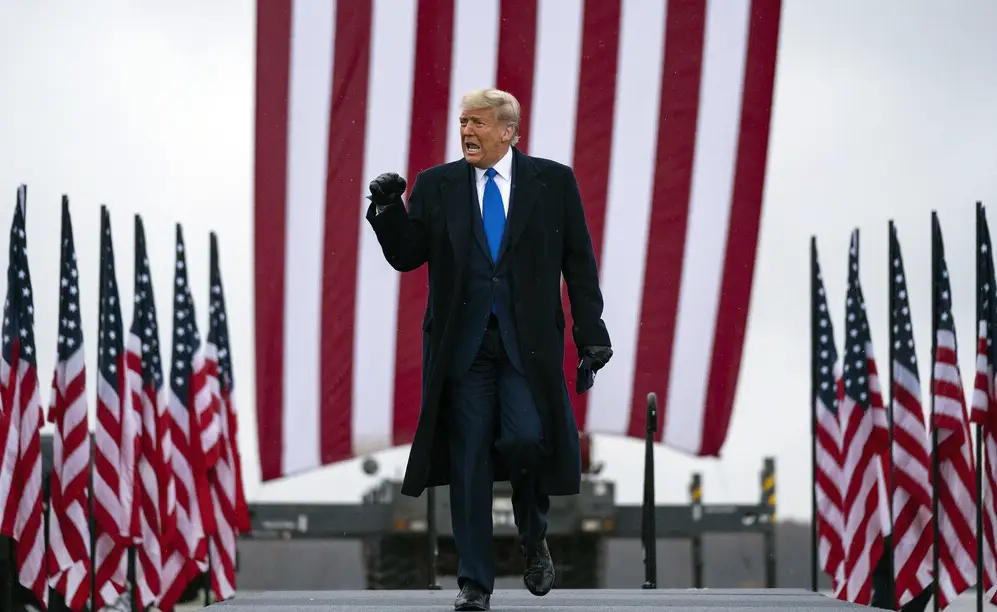One of the paradoxes of the U.S. presidential elections is that one candidate, whose appeal among voters largely lies in the economy, believes that this is not the primary issue of the election. For the first time in a campaign event, Trump openly stated what he had been discussing with his top advisors: that immigration is the central issue, “it surpasses the economy.” But that’s not all—Trump declared that “the United States is now an occupied country. But on November 5, 2024, it will be the day of liberation in the United States.”
Occupied country? Liberation? These conspiratorial and apocalyptic ideas are reminiscent of Latin American dictatorships such as Jorge Rafael Videla’s in Argentina or Augusto Pinochet’s in Chile. Going further back, they echo fascist speeches by Adolf Hitler and Benito Mussolini.
If Pinochet could write a book on freedom while simultaneously destroying it completely in his country by demonizing and murdering opponents, Trump is promising mass deportations and an ephemeral dictatorship on the first day of his government: “the dictatorship of day one.” To make matters worse, the former president claims that immigrants should not be considered people, stating that they poison the nation’s character by “poisoning the blood of our country”—words that closely resemble Hitler’s in Mein Kampf: “All the great cultures of the past perished because the original creative races died out due to blood poisoning.”
The relationship between crime and dehumanization, exploited by leaders like Bolsonaro in Brazil and Bukele in El Salvador, is part of an extremist ideology that predates them. Extralegal violence is presented as the ultimate solution to people’s problems. In this context, the economy and inequality become secondary, and the politics of understanding and democratic dialogue disappear altogether.
A recurring narrative in the region
By the mid-20th century, Brazilian fascist leader Plinio Salgado argued that violence was part of the struggle for the soul of civilization and would save the nation from extinction by destroying those deemed different. In his view, impartiality was impossible in the battle between “good and evil,” and action was required against “degenerates and criminals.”
For Argentine fascists in the early 20th century, the convergence of democracy, immigration, and socialism created more criminals and represented a great threat to “national security.” The famous Argentine fascist writer Leopoldo Lugones claimed that many immigrants were “abnormal” and “vicious criminals” and that their presence was “intolerable.” This connection between criminals, absolute enemies, and ideology was fundamental to fascist thinking. In Mein Kampf, Hitler wrote that enemies “do not live in this world as representatives of honor and sincerity but as champions of deceit, lies, theft, plunder, and pillage.” This dehumanization of adversaries made it easier to strip them of their victimhood. The next steps were deportation, concentration camps, and extermination.
What could happen in the United States?
Many experts wonder how Trump, if he wins the election, could change the political system, given that U.S. democracy is built on a complex system of checks and balances, legal safeguards, and social constraints. However, authoritarian plans are already in writing. We should especially note the Project 2025 from the Heritage Foundation, introduced by Trump’s vice-presidential candidate J. D. Vance. One idea is to reclassify countless civil servants as political appointees, allowing them to be replaced by Trump loyalists. This suggests the erosion of institutional boundaries, concentrating power in the hands of the leader and establishing a state completely subject to his whims.
Concerns over a potential Trump victory and its relationship with fascism recently made the front page of The New York Times. Even Democratic candidate Kamala Harris has said that Trump’s vision can be considered fascist.
Trump is “fascist to the core,” said retired General Mark Milley in a new book by renowned journalist Bob Woodward. The former Chairman of the Joint Chiefs of Staff added that Trump is “the most dangerous person for this country.” Milley’s remarks confirmed what many already believe. Trump’s politics, based on hatred, lies, the glorification of violence, repression, and dictatorial ambitions, are alarmingly similar to classical forms of fascism.
Trump’s understanding of politics is very basic and intuitive. He has no deeper theoretical foundations for his fascist tendencies beyond superficial support for ideas that are already popular among his far-right base. Like Bolsonaro, Trump views far-right politics primarily as a means of personal advancement.
In this sense, Trump’s refusal to accept the democratic system’s verdict after losing the 2020 election combines his anti-democratic impulses with personal fears, the same combination that has defined totalitarians and fascists for decades. The former—and possibly future—president follows Hitler’s playbook by projecting all his hatreds, fantasies, and ambitions onto his enemies.













